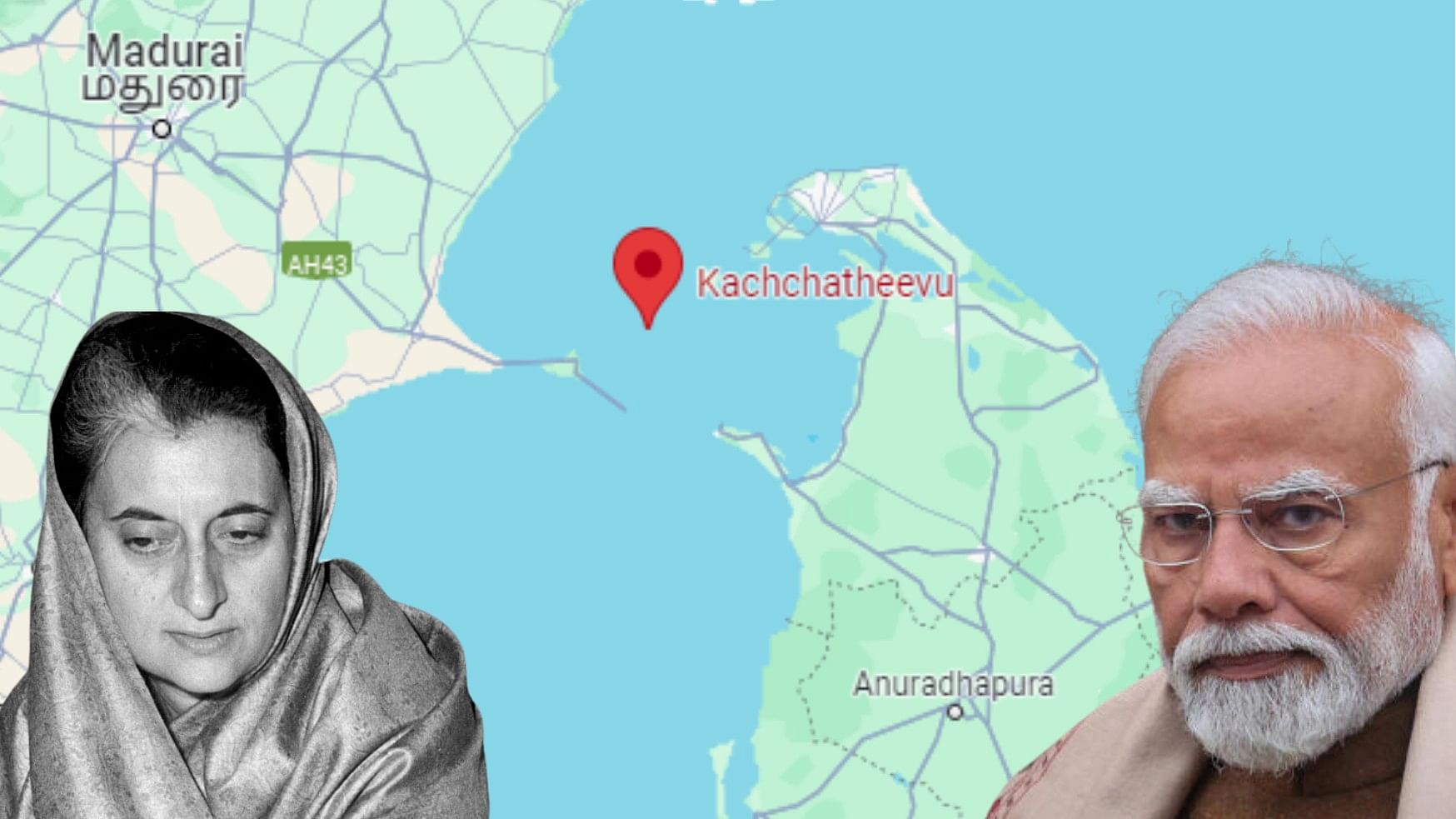
One reason given for the ceding of Katchatheevu was that Indira Gandhi did not want a strip of International waters between India and Sri Lanka as she feared that would be a security risk for India.
Credit: Google maps, Wikimedia Commons and Reuters
Katchatheevu, a tiny island in the Palk Straits between India and Sri Lanka, hardly 300 acres in extent is suddenly being sought to be made an election issue in Tamil Nadu. The islet was ceded by the Indian government to Sri Lanka in 1974 when the International Maritime Boundary Line (IMBL) was drawn between the two countries. The median line was made to take a turn to accommodate Katchatheevu on the Sri Lankan side of the IMBL. Since then, the matter has been a political issue in Tamil Nadu.
India-Sri Lanka ties, which were generally good in the Seventies, took a turn for the worse with the emergence of the movement for a Tamil Eelam (Tamil state) in Sri Lanka. With New Delhi initially supporting the cause of the rebels, Colombo moved to protect its waters. This led to fishermen from India being shot and killed as the Sri Lankan Navy was not able to distinguish between them and the cadre of the Liberation Tigers of Tamil Eelam (LTTE).
Since the bloody, and decades-long civil war ended in 2009, routine arrests of Indian fishermen allegedly crossing into Sri Lankan waters have continued. Boats are seized and auctioned off, and the detained fishermen are released after a lengthy stay in Sri Lankan jails. This has become a routine, and a matter of resentment in south coastal Tamil Nadu around Rameswaram. It is against this backdrop that the issue of Katchatheevu was sought to be raised again.
An RTI application elicited a reply at express speed, and the Bharatiya Janata Party (BJP), starting from Prime Minister Narendra Modi, came out all guns blazing accusing the Congress and its INDIA bloc partner, the Dravida Munnetra Kazhagam (DMK) of having ‘gifted away’ Indian territory in 1974. The saffron party’s deduction from this was that the Congress could not be trusted to safeguard India’s sovereignty after what it did in 1974.
Following Modi’s statement on March 31, on April 1, External Affairs Minister Jaishankar followed up with a press conference on the same lines.
The history of Kachchatheevu is complex. This uninhabited island was part of the territory of the Sethupathi kings of Ramnad for over 200 years. However, post-Independence its ownership was not clearly defined with both India and Sri Lanka laying claim to it. The Indira Gandhi government decided that when the IMBL was drawn up, Kachchatheevu would go to Sri Lanka and India in turn would get the Wedge Bank — a fish-rich area close to the coast of Kanyakumari. Parliament approval was not sought as the government said that ceding Kachchatheevu was not tantamount to ceding sovereign Indian territory as its ownership was unclear. So, by a resolution, the deed was done. Initially, India enjoyed fishing rights in the area, but that was ceded by another agreement in 1976.
The ceding away of Kachchatheevu has been a point of contention for the All India Anna Dravida Munnetra Kazhagam (AIADMK), the main opposition party to the ruling DMK in Tamil Nadu. DMK’s M Karunanidhi was the chief minister when the agreement was signed in 1974. MGR and Jayalalithaa, both former chief ministers have used the issue repeatedly to accuse the DMK of having failed the fishermen of the region, and the people of Tamil Nadu.
That said, the issue hardly has any electoral appeal now. When Indian fishermen were targeted by the Sri Lankan Navy, this found some resonance with the public. Political parties (incorrectly) claimed that if Kachchatheevu was with India, our fishermen would be safe. Whipping up emotions in the region is not difficult. Late BJP leader Sushma Swaraj, in 2014, launched a ‘Kadal Thamarai’ (Sea Lotus) movement to woo the fishermen, but it did not make much headway.
One reason given for the ceding of Kachchatheevu was that Indira Gandhi did not want a strip of International waters between India and Sri Lanka as she feared that would be a security risk for India. Sri Lanka at that time was seen as a close friend of India, and so the prime minister may have been inclined to cede the island rather than have it as no man’s land, and leave it in International waters.
It is unclear what the BJP hopes to achieve by raising the issue now. After all, on August 26, 2014, Attorney General Mukul Rohatgi told the Supreme Court that retrieving the island was all but impossible. The Modi government is not known to have done anything to raise the issue of retrieving the island with the Sri Lankan government, if that indeed is what it wishes to do. The issue has almost no political appeal in Tamil Nadu beyond perhaps one Lok Sabha constituency: Ramanathapuram, and even there it is hardly a major concern.
For the BJP, desperately trying to make electoral headway in Tamil Nadu, this may be another salvo to try to tarnish the record of the Congress and the DMK. This time it seems to be firing blanks.
(Sumanth Raman is a Chennai-based television anchor and political analyst.)
Disclaimer: The views expressed above are the author's own. They do not necessarily reflect the views of DH.